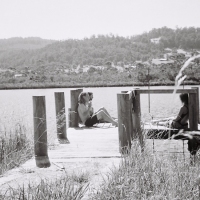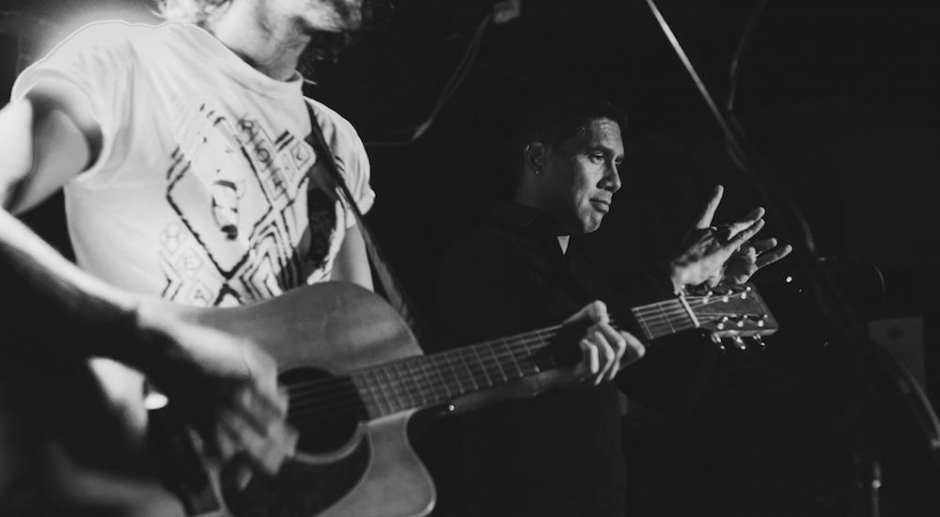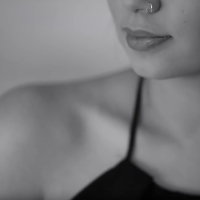 Rediscovering Human Decency When We Need It MostInstead of pigeonholing people, it's time to start talking to them.
Rediscovering Human Decency When We Need It MostInstead of pigeonholing people, it's time to start talking to them.

Musicians 4 Hearing & Deafness In The Music Industry
Just because you can't hear doesn't mean you should be excluded.
Words by Jess Phillips. All images by Xavier Fennell.
Read part one of Jess's story HERE.
I have been fascinated and simultaneously terrified by the insidious nature of hearing loss in a big way since mum’s operation. However, my excursion back in August 2015 to an Auslan interpreted music gig at the Gasometer in Melbourne challenged every preconception I had about music consumption and what was requisite in order to live a big life.
The gig was organised by Siobhan McGinnity (pictured, below) who together with a group of like-minded Melbourne musos established Musicians 4 Hearing. The group get together and produce Auslan interpreted live music events around Melbourne, with the monies raised being directed overseas to counties such as Cambodia, in a bid to support vital hearing services.
Arriving early and alone I picked up my complimentary earplugs and a Hearing Awareness Week magnet at the door. I asked for some water at the bar and was handed an icy cold glass. Taking it in both hands I strolled straight to the band floor and waited, arms folded across the scratchy polyester of my dress, for the show to begin.
I got talking to a few patrons and between us we expressed our mutual excitement at such a rare opportunity to be here. One of the women I spoke with was indeed deaf. We spoke in-between acts about where we lived, our grandparents and what we did when we weren’t at live music gigs and throughout our conversation, I noticed that I did this thing where I tried to be nicer and politer, more friendly. I was curious about how the experience of being at a live music gig was for her…but I didn’t ask because I felt conflicted about whether I had a right to.
What would I ask? How would I ask it? Would she be offended?
On the tram ride home I reflected, a lot. Clearly there was a difference in how we both digested the music, in how we experienced it and in what it roused within us but was it my place to be overtly curious about a stranger’s hearing loss?

In an effort to answer some of these, I sought out Siobhan, the M4H creator. Siobhan moved to Melbourne from Perth to complete her Masters in Audiology at Melbourne Uni and is currently working on her PhD, exploring music-induced hearing loss within the live music scene. She is particularly passionate about reducing the stigma that might otherwise prevent musicians from having their hearing tested for fear of the result or that may stop them from wearing hearing protection whilst performing to prevent hearing damage for fear of being viewed as ‘soft,’ by their comrades.
I asked Siobhan what inspired her to create the not for profit. She said straight out that “the shock of inequality, internationally, that the likelihood of a person being struck by lightning was much, much higher than them being able to access an audiologist like me,” spurred its creation.
When I asked her about what drives her passion for increasing the accessibility of live music to members of the deaf community, her no nonsense response was quite simply, “because it should be a thing and it’s not. There’s no reason why it shouldn’t be done. Everyone should be invited to the party. In Australia it takes some people up to seven years before they will accept an aid, from the time of recognising there is something not quite right because that stigma is so strong. Hearing loss is such a slow and insidious development and it can be hard for people to appreciate the impact on their capacity to communicate until it’s too late.”
Siobhan wasn’t willing to speak on behalf of the deaf community and what the experience for someone with a hearing impairment was like and so she referred me onto Zoe. And as it so happens Zoe was my fellow patron from the gig in 2015.
Zoe is also an Audiologist and unlike my mum, Zoe was deaf from birth and at two and half. She was diagnosed with mild to profound congenital sensioneural hearing loss in her left ear and severe to profound hearing loss in her right ear. Zoe was given every opportunity to inhabit and excel in a hearing world as a child. Growing up in far North Queensland, she attended a state school initially with a specialised deaf facility for the first three years and from there went on to a Catholic girls primary and secondary boarding school in Brisbane. In those first years at primary school, Zoe had one-on-one tuition with a speech and language therapist and when she graduated onto high school she received generous government support towards funding an English and Maths tutor to ensure she wouldn’t fall behind the other students.
Zoe described for me the time before the internet, when as a child she would urge her brother to write out the lyrics to songs so as she could sing along with her dad who had a beard, and made lip reading difficult. I asked Zoe whether she would be offended if a stranger asked her about her experience of a live music event like the one at the Gasometer. “No, I wouldn’t be,” she replied.
The M4H gig was the first time Zoe had attended an Auslan interpreted live music event. “I’d seen plays interpreted, but not music, it was incredibly memorable. The interpreter, Marcus (pictured in the header photo) enabled me to get more of the lyrics, as it’s often difficult to lip read musicians who have their lips stuck to the microphone.”
A detail I had selectively forgotten from that night was that Marcus, the Auslan interpreter on stage had his hands, eyebrows and lips painted with glow in the dark paint. This enabled those in the audience to connect with the emotive aspects of his immersion in and expression of the music, without detracting from the music. Zoe said that lots of hearing people commented that he was really into the music, to which she said “well how else is he going to communicate what the music is doing (or inciting people to feel), for deaf people?”
Zoe said that the confrontation many hearing people experience when encountering someone with a disability may be the reason why there is much segregation when it comes to deaf and hearing audiences and the performing arts. “People like Siobhan remove this confrontational aspect for musicians through these events she puts on; we need more people like her to create a societal shift!”
Confrontation, YES! Zoe had nailed it and yes that unwillingness to feel discomfort, to sit with it, whilst remaining open to having your perception changed is a tough thing to do, but so necessary. Not just in regards to improving access to the performing arts for those living with a disability, but in order to heal grief, manage one’s mental health and experience fulfilling relationships.
Enjoyment of music, of sound, of community, of participating is complex, nuanced, fluid and ridiculously subjective. Curiosity is a good thing, and perhaps music is not the only means for trailing back through the richness of the past and amplifying the present.
Follow Musicians 4 Hearing on FACEBOOK, and head to the Auslan WEBSITE for more info.
 Rediscovering Human Decency When We Need It MostInstead of pigeonholing people, it's time to start talking to them.
Rediscovering Human Decency When We Need It MostInstead of pigeonholing people, it's time to start talking to them.
 We owe Thelma Plum, and other victims of abuse in Aus' music, a big apologyIt’s time we in the music media put our hands up and become more accountable.
We owe Thelma Plum, and other victims of abuse in Aus' music, a big apologyIt’s time we in the music media put our hands up and become more accountable.